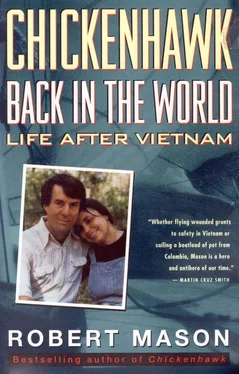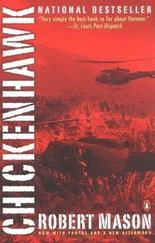Robert Mason - Chickenhawk - Back in the World - Life After Vietnam
Здесь есть возможность читать онлайн «Robert Mason - Chickenhawk - Back in the World - Life After Vietnam» весь текст электронной книги совершенно бесплатно (целиком полную версию без сокращений). В некоторых случаях можно слушать аудио, скачать через торрент в формате fb2 и присутствует краткое содержание. Год выпуска: 2013, Издательство: BookBaby, Жанр: Старинная литература, на английском языке. Описание произведения, (предисловие) а так же отзывы посетителей доступны на портале библиотеки ЛибКат.
- Название:Chickenhawk: Back in the World - Life After Vietnam
- Автор:
- Издательство:BookBaby
- Жанр:
- Год:2013
- ISBN:нет данных
- Рейтинг книги:3 / 5. Голосов: 1
-
Избранное:Добавить в избранное
- Отзывы:
-
Ваша оценка:
- 60
- 1
- 2
- 3
- 4
- 5
Chickenhawk: Back in the World - Life After Vietnam: краткое содержание, описание и аннотация
Предлагаем к чтению аннотацию, описание, краткое содержание или предисловие (зависит от того, что написал сам автор книги «Chickenhawk: Back in the World - Life After Vietnam»). Если вы не нашли необходимую информацию о книге — напишите в комментариях, мы постараемся отыскать её.
Chickenhawk: Back in the World - Life After Vietnam — читать онлайн бесплатно полную книгу (весь текст) целиком
Ниже представлен текст книги, разбитый по страницам. Система сохранения места последней прочитанной страницы, позволяет с удобством читать онлайн бесплатно книгу «Chickenhawk: Back in the World - Life After Vietnam», без необходимости каждый раз заново искать на чём Вы остановились. Поставьте закладку, и сможете в любой момент перейти на страницу, на которой закончили чтение.
Интервал:
Закладка:
“Where you going from here?”
“Thought I’d go meet my editor at Viking and then Patience and I are going to Maine.”
“You going to work up there or are you going to fuck off?”
“No time to fuck off. I can work there as well as anywhere.”
Patience parked near a fire hydrant on a side street in the middle of New York City and waited for me. I walked into a huge building on Madison Avenue and took the elevator up to the Viking Penguin floors. While I waited in the reception area, I felt a lot like a poor relation visiting a rich uncle. After a minute, Gerald Howard came out. He was a young guy, younger than he’d sounded on the phone. He still didn’t know about my arrest and he looked to me then like someone who’d turn pale if he knew he was talking to a convicted felon. We went to his office.
We chatted. Gerald sat in front of a window overlooking the city.
I could see a comer of Central Park in the distance. The differences between our worlds were profound, but we had an overlapping interest— Chickenhawk . By some strange process that I still don’t understand, my manuscript came to be read by someone who liked it and could do something about publishing it. Gerald Howard was the right man at the right time. He was a young editor in the Penguin paperback division, and he wanted to be a hardback editor for Viking. This was to be Howard’s first hardback book. He had just gotten the second part of my book a couple of days before and had already read it. I was relieved to hear him say it stood up to the first part, was even, in fact, better.
While Howard talked, I was distracted and made poor conversation. The fact that I’d just been sentenced to prison wouldn’t leave me. I kept thinking about Patience waiting downstairs, and felt conscious of the time. I told Gerry, as he insisted I call him, that I was happy he liked my book, but that Patience was the real writer in the family. She’d be famous someday. I looked at my watch and said I really ought to be going and how soon did he think Viking would be sending me a check.
“I’ll get them to expedite the check,” Gerry said. “Knox says you’re broke.”
“That’s a fact. And—” I almost said and going to jail, but I was afraid they’d change their minds. I shrugged.
“Well, that’s going to change,” Gerry said. “I have a good feeling about this book.”
Gerry walked me back to the reception area and we said good-bye.
By dusk the next day, Patience and I were in a cabin on a lake in Maine.
Patience has lots of relatives, and they all come to Maine in the summer. Aunt Priscilla stayed two cabins down the shore, Aunt Pat lived two cabins up the shore. Uncle Roger lived across the lake. Patience’s brother Chris lived up the road year-round; her sister Vickie, also a permanent resident, lived three miles away. They all knew me because Patience and I had been here while I was in the Army, before and after Vietnam. Now they knew I’d been convicted, was going to jail, and also that I’d sold a book. Nobody, including me, knew how to act, proud or ashamed.
I had my electric typewriter and a pack of paper. That’s all it takes to be a writer. I worked at the kitchen table in the cabin. And as long as I worked, I felt okay. I began part three, which I called “Short Timer’s Blues.” This was a tough one to remember. Near the end of our tours, the pilots were just plain overworked. I and my buddy, Jerry Towler (who I was calling Gary Resler in the book because I still hadn’t heard from him), had each flown close to a thousand missions by the time we’d transferred to the Forty-eighth Aviation Company, called the Blue Stars. As we got closer to our departure date, and as the missions got hotter and hotter, and when the Army forgot about their promise to rotate short-timers back to ass-and-trash duty in Saigon and other places, I began to have real problems: hallucinations. I saw my electric razor burst into flames—as real as life—in the mosquito netting over my cot one night near Dak To. I had weird periods when I’d lose my balance while I walked. I had temporary blackouts when I’d see my face suddenly an inch from the page of a book I was reading and not know how I got there. I was losing it.
And now I was losing it in Maine.
I’d quit writing after lunch and go for walks in the woods with Patience. It was no good. I’d walk a few hundred feet and get breathless. I felt like a deflated balloon. All my strength left me when I tried to relax. I stayed in the cabin and read. I was reading The World According to Garp , which I liked very much. In the evenings, Vickie and her husband, Peter, usually came down to the cabin and we sat around and talked. I played chess with Peter.
When everybody went home, when Patience and I went to bed, I’d sit bolt upright against the headboard, unable to sleep. My pulse raced. I had chest pains. My hearing would mysteriously fade in and out, like someone switching the balance on a stereo. I tried the meditation tricks the VA had taught me. I could relax every muscle in my body to absolute biofeedback perfection and still feel undefined panic take over.
For two months I wrote every morning, read every afternoon, and panicked when it was quiet and I was alone with myself. Even Alan Watts’s heartening words about life, the universe, and everything were of no comfort.
In October Patience started cleaning houses in Gainesville to make ends meet.
By Christmas 1981, I’d finished the manuscript and sent it to Viking. Gerry Howard called. He’d found out I was going to jail by reading the last page of the manuscript. He told me he was behind me all the way and so was Viking. He told me that the editing process would take a while—he expected the book would get to the stores sometime early in 1983, over a year after I’d finished it.
I got a letter from Jerry Towler. He sounded just like he had in Vietnam. I don’t know why that was so surprising except that sixteen years had passed since I’d last seen him. He said he and his wife, Martie, were taking their two sons to Disney World and why didn’t they stop by? I wondered how to break the news to my long-lost brother-in-arms that I was soon to be a convict.
A week later, Jerry called. They were in High Springs. Patience and I drove into town to show them the way to our cabin. When I saw him sitting in his car, I noticed he’d changed. He used to be a young, skinny guy; now he was older, thicker. He remarked that I’d changed, too. In just a few minutes, the changes became invisible and the guy I’d flown with was back, grinning the same impish grin. He introduced me to Martie and his two sons, Greg and Ryan, and we got back into our cars and drove out to the cabin.
I gave them a tour of our woods. I’d cut a mile and a half of trails through it and considered the whole woods a home. Certain clearings were like rooms to me. I showed them the local plants and bugs and especially the spiders. Huge orb weavers, called banana spiders by the locals, and Nephila clavipes in spider books, were special to me. I’d been studying them for years. Their silk is the strongest natural fiber in the world and is used to make string and fishnets in Central and South America. Martie was decidedly unimpressed, even when I showed her you could stick your finger right up to the face of one of these three-inch spiders. “See, it won’t bite. Not unless you grab it,” I said. Martie shuddered and wondered if we could go back to the cabin now.
We had lunch and talked for the few hours they could spare. I kept trying to think of some smooth way to break the news that I was soon going to jail, but I couldn’t. I decided to let Jerry read about it. I promised that I’d have Viking send him an advance copy. “Yeah. Then it’s too late for me to make it right,” Jerry said.
Читать дальшеИнтервал:
Закладка:
Похожие книги на «Chickenhawk: Back in the World - Life After Vietnam»
Представляем Вашему вниманию похожие книги на «Chickenhawk: Back in the World - Life After Vietnam» списком для выбора. Мы отобрали схожую по названию и смыслу литературу в надежде предоставить читателям больше вариантов отыскать новые, интересные, ещё непрочитанные произведения.
Обсуждение, отзывы о книге «Chickenhawk: Back in the World - Life After Vietnam» и просто собственные мнения читателей. Оставьте ваши комментарии, напишите, что Вы думаете о произведении, его смысле или главных героях. Укажите что конкретно понравилось, а что нет, и почему Вы так считаете.












